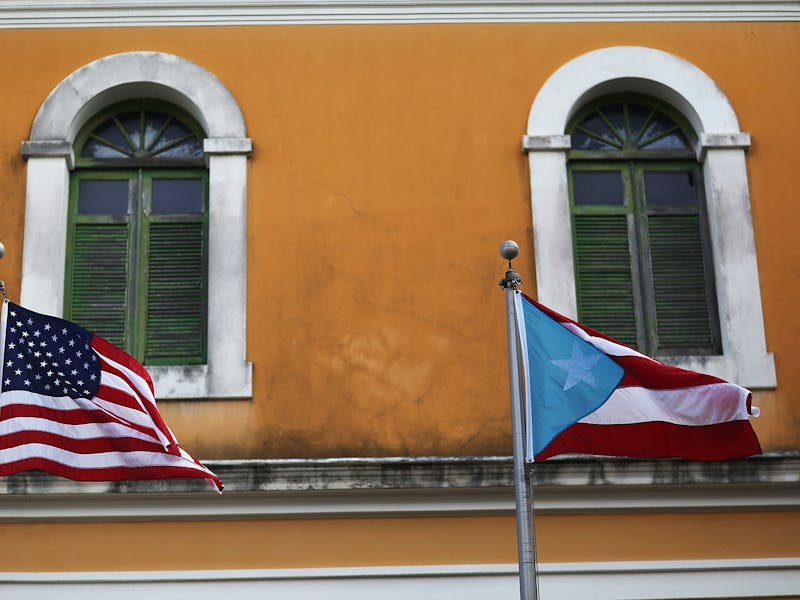Why Puerto Rico Probably Won't Become the 51st State
Even after Puerto Ricans voted overwhelmingly in favor of statehood.

Even after Puerto Ricans voted overwhelmingly in favor of statehood …
Even after Puerto Rico Governor Ricard Rosselló declared change would come, saying, “From today, the federal government will no longer be able to ignore the voice of the majority of the American citizens in Puerto Rico” …
Even though the official platforms of the Republican and Democratic parties support Puerto Rican statehood, and U.S. President Donald Trump has spoken in favor of it …
Puerto Rican statehood is still seen by most as unlikely.
“To make a long story short, the prospects are between zero and negative-10 percent,” Carlos Iván Gorrín Peralta, a territorial-law scholar, told The Atlantic.
New York City Mayor Bill de Blasio participates in the annual Puerto Rican Day Parade.
What’s stopping the U.S.-controlled Caribbean Island from becoming the 51st state?
For Republicans, at least, practical considerations may be getting in the way of ideological support, with speculation that Puerto Rico would lean Democratic. This, however, is based on voting patterns of Puerto Ricans who already live in the states. Those on the island tend to be more socially conservative, and voters are split along party lines, but that is often determined more by how the party positions itself towards the question of statehood — the most popular political question in Puerto Rico.
Representative Luis V. Gutiérrez, an Illinois Democrat whose parents migrated to Chicago from Puerto Rico, issued a statement before Sunday’s vote saying that Trump’s administration would never let this happen. “The supporters of statehood are selling a fantasy that a Latino, Caribbean nation will be admitted as a state during the era of Donald Trump,” wrote Gutiérrez. “That states, many of which supported Trump, will accept a Spanish-speaking state that will receive just as many Senators and maybe even more House seats than they currently have.”
Trump, for his part, is passing the buck. “This matter is something that’s going to be determined now that the people have spoken in Puerto Rico,” began Press Secretary Sean Spicer in a press conference on Monday. “This is something that Congress has to address.”
Congress, meanwhile, doesn’t actually have to take up the matter at all. The vote was nonbinding, and there are concerns about the validity of the ballot. While the vote had the highest margin of victory for statehood ever (and just the second of the five referendums to support this choice), less than a quarter of Puerto Ricans voted, down 300,000 votes from the 800,000 who cast their vote in favor of self-determination in 2012.
When asked to comment on whether the United States will honor the vote’s response, a Department of Justice official told Latino USA, “The Department has not reviewed or approved the current ballot language and any suggestion to the contrary is incorrect.” This was before the vote, however, and the DOJ has not issued any further statements, and as it is, the referendum is nonbinding.
Hillary Clinton wears a bracelet that says "vote" on a visit to Puerto Rico on May 31, 2008.
Statehood would grant Puerto Ricans the franchise and might help reverse the island’s decade-long recession.
Governor Rosselló’s next step in the push for statehood involves a modern interpretation of the Tennessee Plan that would put the matter directly before Congress. The Puerto Rican government would name two senators and five congressmen to go to Washington and demand to be seated. The plan to demand admission into the union based on the outcome of local elections worked for its namesake and six other former territories but, still, another wrinkle in the bid to statehood emerges.
Before accession to the states can be considered, it appears that Congress would need to incorporate Puerto Rico first. Following racialist Supreme Court decisions known as the Insular Cases, the territories America added to the country — Puerto Rico, Guam, and the Philippines — after the Treaty of Paris ended the Spanish-American War in 1898, were designated as colonial properties and not future states. This is different from the 37 states that have been added to the union from the original 13. Those then-territories (the nomenclature is confusing, for sure) were annexed and earmarked to be admitted to the union eventually, as per the Northwest Ordinance of 1787. While Puerto Rico was given commonwealth status in 1952, Congress still needs to determine if it will incorporate Puerto Rico to even make it eligible for statehood.
People march up Fifth Avenue in New York in the annual Puerto Rican Day Parade.
That America keeps quasi-colonial outposts may seem hypocritical given how much it prides itself on liberty and democracy.
Rosselló pointed out as much, saying, “It would be highly contradictory for Washington to demand democracy in other parts of the world, and not respond to the legitimate right to self-determination that was exercised today in the American territory of Puerto Rico.”
John Oliver did the same on HBO, with a recent segment on the history of colonialism in the U.S. and the plight of its overseas territories. Native son and Hamilton-creator Lin-Manuel Miranda even joined to tell the story of “a commonwealth with not a lot of wealth / a not-quite nation / $70 billion topic of conversation.”
For Puerto Ricans holding out hope, one silver lining is that another vote is scheduled for October 8. That one could in theory be approved by the DOJ, which might, just might, get the U.S. to respond.